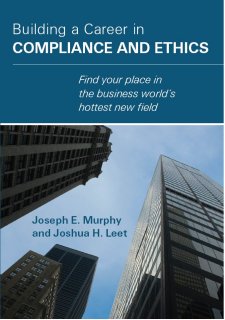These excerpts are taken from our interview of Odell Guyton, a compliance officer for a large corporation.The time I spend is really involved with a lot of senior executives at the company both in promoting and educating, making them and other employees aware of what compliance means and what we do as a group. We are also being partners with them. When I say partners, I mean that in a broader sense, in terms of assisting them in navigating through some of the complexities of this compliance area. We’re exposing them to how compliance touches their day-to-day work, and how we can be useful in making their work less risk-full, from a compliance-risk perspective, as well as providing guidance with regard to policies and company positions that they may not be exposed to on a regular basis, or have specific knowledge about.
There’s probably a larger, more visible opportunity now in multi-national corporations, in publicly traded corporations, primarily because of the impact of Sarbanes-Oxley. But then you have other laws that are coming into play at the state and local levels that are emphasizing compliance and emphasizing corporate ethics, company ethics, company compliance. You have things that are occurring in companies now that show a greater sensitivity/visibility to ethical conduct: not necessarily conduct that violates a legal standard, but conduct that violates ethical-sensitivity precepts.
I've never hired anyone just based on their degree; I hire people on the whole person. I’ve taken chances on people that haven’t had any formal training in compliance, because I knew that they had the ability and aptitude to understand (they would get the job done) over someone that had formal education in it. What can I say? I don’t think that having any particular piece of paper is going to make you more marketable; it depends on the individual job.
Odell Guyton's interview appears in both Working for Integrity and Building a Career in Compliance and Ethics.
(All interviewees spoke to us about their own personal experiences and opinions; interviewees were not acting as a spokesperson or otherwise representing their current or former employers.)
Wednesday, February 28, 2007
Marshaling Integrity - Odell Guyton
Posted by
J.E. Murphy & J.H. Leet
at
11:48 AM
![]()
Labels: Marshaling Integrity, Tidbits: WFI


